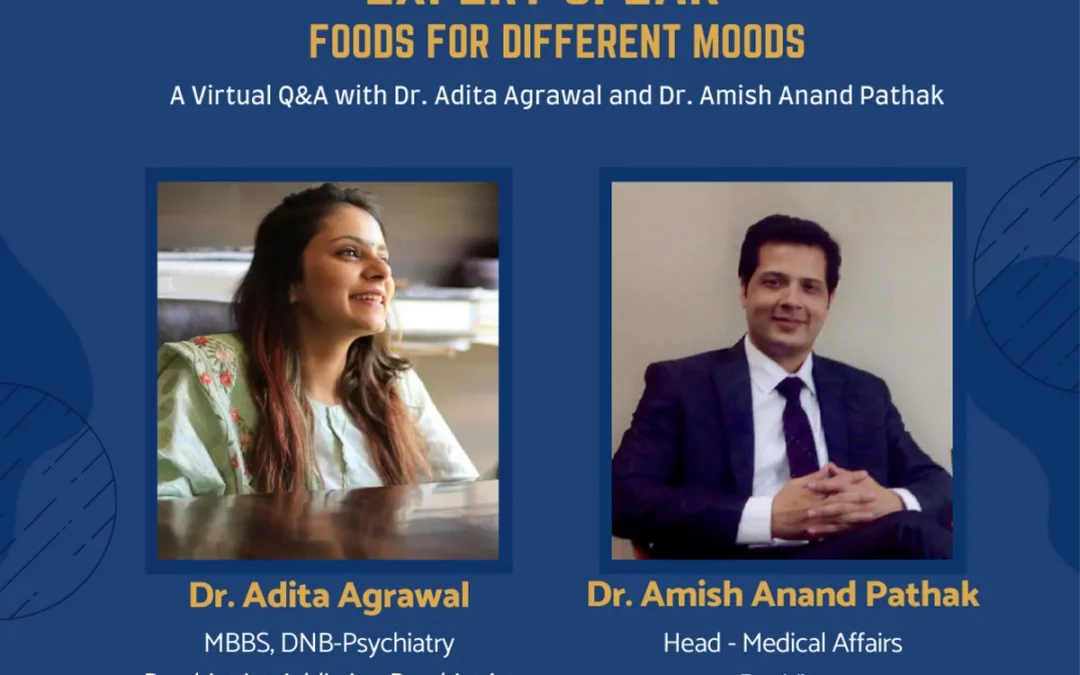Mental health issues are a rising concern for many as we currently battle the pandemic. Isolation, anxiety, and fear have crept into our lives, which has left many feeling helpless and lonely. Recognizing mental illnesses, accepting them, and seeking help is even more challenging. Be it mood swings or a persistent feeling of sadness, and it is vital to acknowledge emotions and accept them. The mind is the master of the body; mental health is as important as physical health.
DocVita took the opportunity to raise awareness on this World Suicide Prevention Day. Our Head of Medical Affairs, Dr. Amish Anand Pathak, spoke to the esteemed psychologist Dr. Adita Agrawal. Dr. Agrawal is a psychiatrist practicing in Mumbai, specializing as a counselor, de-addiction specialist, and relationship therapist. The two professionals covered many issues in this edition of DocVita’s Expert Speak sessions. From mental health during the pandemic to nutrition. And how one’s diet impacts their mental state.
The Link Between Nutrition and Mental Health
“The lockdown has affected people socially and emotionally,” Dr. Adita said. “It has created a feeling of isolation, especially because you cannot meet your loved ones. Many fear for the safety of their loved ones. Cases of depression and anxiety have increased during the pandemic. And it has been an emotionally challenging period”, the psychiatrist told us.
Nutrition has a lot to do with our mental state. This subject matter prompts a discussion about food. Dr. Amish asked the psychiatrist if there are certain foods we can consume that boost good mood. Before answering, Dr. Agrawal wanted to remind the audience of one crucial point. “Your diet could only help with mental illness, but not cure it.” One must need to consult a professional for certain mental health conditions. It is equally important to keep the intake in moderation. And check if you are allergic to any food item before consuming it.
Reducing Anxiety Through Your Diet
“What food can we eat to reduce anxiety, something many are experiencing today?” Dr. Amish asked. The psychiatrist suggested that specific dietary changes can help with overcoming depressive symptoms. She suggested decreasing the intake of coffee or other high-caffeine beverages. And replacing them with herbal teas like chamomile and green tea. Higher caffeine content might lead to specific mood disorders. Consuming whole foods and using more turmeric in food is also helpful. She noted that individuals with folate deficiency often experience anxiety. And in some cases, even phobia and fear. Some food items which are rich in folic acid are down below:
-
- Peanuts
- Sunflower seeds
- Dark leafy greens
- Chickpeas
- Yogurt and
- Salmon
- Olive oil
“All the mentioned foods have a soothing and relaxing effect on the body,” Dr. Agrawal mentioned.
Dealing With Anger
“Now that people live together all the time, we have seen an increase in anger and irritability, affecting family relationships. How can we help individuals deal with anger?” Dr. Amish asked. The psychiatrist explained that anger is an important emotion, even more so when dealing with personal relationships.
In some cases, it might even lead to substance abuse issues. As a result, alcohol consumption leads to the deficiency of vitamins and minerals. Certain minerals can help to combat this temperament problem. Such as foods and drinks rich in the natural “chill pill,” Magnesium. Bananas, peanut butter, and avocados are some magnesium-rich options. Foods rich in omega-3 fatty acids like walnuts and flax seeds help elevate one’s mood. The Doctor added that drinking grape juice with fennel and cumin seeds is also a great option.
“If you want to boost your confidence. Or overcome shyness. One can even consume salmon, tuna, legumes, beans, and peas,” Dr. Agrawal added.
What to Eat for Sexual Health
Answering a question from Dr. Amish about sexual health, Dr. Agrawal said there are some common sexual problems in which food can factor. Issues like lack of libido and erectile dysfunction are some of the common problems. To increase one’s libido, consuming aphrodisiacs is an excellent way. Some power-packed zinc-rich foods help with sexual stamina, such as:
-
- Oyster
- Watermelon
- Apple
- Banana
- Fig
- Avocado
- Walnuts
- Pomegranate
- Pumpkin seeds and
- Pine nuts
She added that dark chocolate is not only an aphrodisiac but also a great mood elevator.
Vitamins for Brain Fog
“Brain fog and lethargy are also common problems many people face today. How can we deal with these issues where we feel confused and cannot make decisions?” asked Dr. Amish. “As we are always in an isolated environment at home, brain fog has become common nowadays. Drinking green tea induces alertness and is a great option”, replied Dr. Adita. For lethargy, the first thing she suggested was a routine investigation. To ensure that it is not due to any other illnesses. Lethargy, tiredness, and bad mood are often due to mineral deficiency, such as vitamin D, vitamin B6, vitamin B12, and folate. Consuming foods rich in these nutrients can help problems like beans, dairy products, eggs, and beetroot juice rich in iron.
Help With Depression
The Doctor also addressed the difference between sadness and depression. While sadness is a common and essential emotion, it differs from depression. Temporary sadness is normal. But if the sadness is persistent. Along with feelings of worthlessness and a lack of energy. It might be a symptom of depression. You can eat foods rich in antioxidants like berries and dark chocolate to boost your mood. Depression is due to decreased levels of serotonin, the happy hormone. Or other factors such as low levels of dopamine, which impact your impulse control. “Green tea and bananas can work wonders. As they can increase serotonin levels in the body,” the Doctor concluded.
Coping With Mood Swings
The psychiatrist also answered a few queries from the audience regarding mood swings. Exercise and yoga are reasonable solutions for mood swings triggered by the menstrual cycle. Medication with primrose oil is also helpful. But in cases of frequent mood swings in a single day, food can help. The Doctor advised consuming things rich in good fat, fatty acids, and amino acids. Such as nuts, seeds, and eggs, and to help with emotional stability. For pregnant women, she suggested breathing exercises or consulting therapy. While also keeping the diet into consideration for the well-being of overall health.
On a parting note, Dr. Adita addressed many issues regarding our society and mental health. While we have progressed in the right direction over the last few years, there is still a long way to go. It is essential to de-stigmatize mental health issues. And seeking help from professionals should be encouraged. Many myths surround mental illnesses, like getting addicted to pills and medicine, which are untrue. The best person to take care of you is you; before you take an extreme step, pause and call for help. “Pay close attention to your emotions and symptoms and seek help from an expert,” she concluded.
Seek Help From an Expert With Docvita
Mental health matters. Due to the pandemic, many are afraid to visit clinics. At DocVita, you can consult psychiatrists like Dr. Adita for audio or video consultations. It is vital to consult a professional; you can find many experienced doctors on our platform. On World Suicide Day, Team DocVita would like to thank Dr. Adita for her valuable time. And extend our gratitude to all mental health professionals who help us struggle with complex issues with the utmost empathy and compassion.
Get Personalised Advice On Your Diet from a Senior Dietician.


